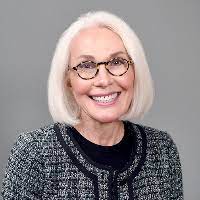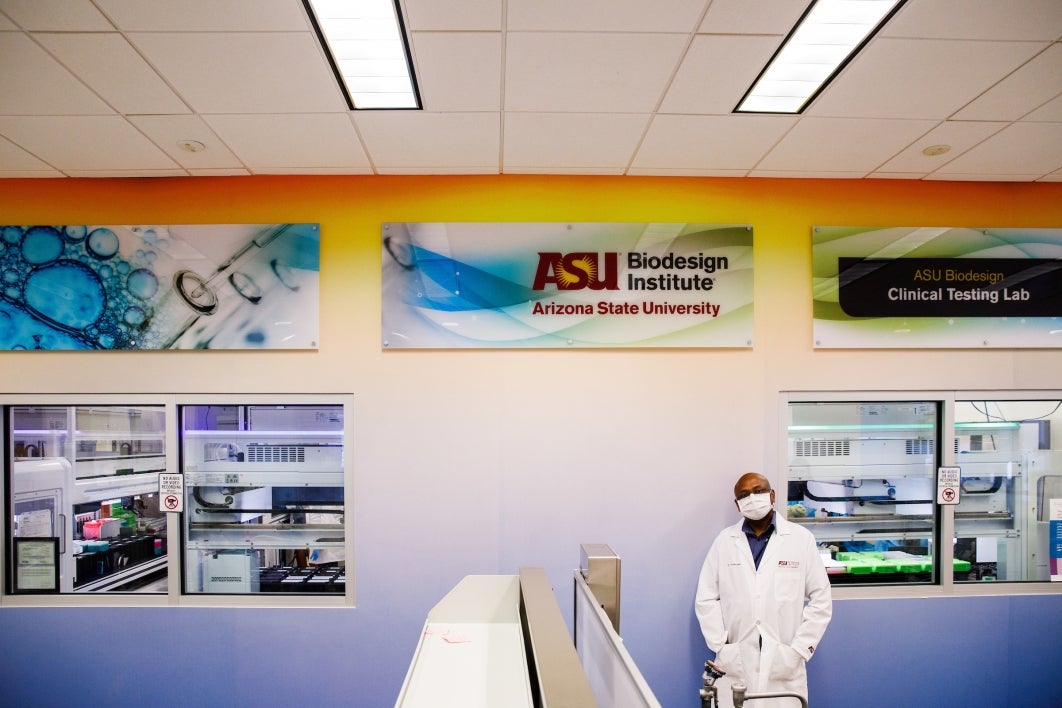ASU Biodesign Clinical Testing Laboratory receives coveted CAP accreditation

Joshua LaBaer (front) pictured with colleagues from the Clinical Testing Laboratory. LaBaer is the director of the laboratory as well as executive director of the Biodesign Institute and director of the Biodesign Virginia G. Piper Center for Personalized Diagnostics. Photo by Andy DeLisle.
The Biodesign Clinical Testing Laboratory at Arizona State University has received accreditation from the College of American Pathologists (CAP), the nation’s largest organization of board-certified pathologists.
The CAP Accreditation Committee has awarded accreditation based on results of rigorous onsite inspection as part of the CAP’s accreditation programs.
Since the start of the pandemic, the Biodesign Institute at ASU has dedicated its specialized resources to mass testing for COVID-19 and sequencing genomes of the viral pathogen SARS CoV-2.
On Oct. 8, ASU announced the lab’s milestone of 1 million COVID-19 tests. The prestigious accreditation is the latest benchmark of excellence for the clinical testing lab, which has played a vital role in COVID-19 surveillance across the state, including in underserved communities.
Carolyn C. Compton, the facility’s director, was advised of this national recognition and congratulated the lab for the excellence of the services being provided.
“CAP accreditation is widely recognized as the highest bar for a clinical laboratory and signifies excellence on all levels. It is not easily attained for any laboratory,” Compton said. “I am especially proud that the (ASU Biodesign Clinical Testing Laboratory) was able to achieve this while under the duress of an international pandemic.”
Compton, board-certified in both anatomic and clinical pathology, is a professor in ASU’s School of Life Sciences.
Carolyn C. Compton
The ASU Biodesign Clinical Testing Laboratory (ABCTL) is one of more than 8,000 CAP-accredited facilities worldwide. The U.S. government recognizes the CAP Laboratory Accreditation Program, begun in the early 1960s, as being equal to or more stringent than the government’s own inspection program.
During the CAP accreditation process, designed to ensure the highest standard of care for all laboratory patients, inspectors examine the laboratory’s records and quality control of procedures for the preceding two years. CAP inspectors also examine laboratory staff qualifications, equipment, facilities, the lab’s safety program and record, and overall management.
“It is deeply gratifying to see the hard work and dedication of all involved in the clinical testing lab recognized with this important accreditation,” said Joshua LaBaer, executive director of the Biodesign Institute and director of the Biodesign Virginia G. Piper Center for Personalized Diagnostics. “The accreditation helps us continue the outstanding services we provide in terms of statewide COVID-19 surveillance, as well as expand our laboratory operations to address other threats to public health.”
The Biodesign Clinical Testing Laboratory had already been certified by the Clinical Laboratory Improvement Amendments, or CLIA, designed to ensure quality handling and testing of diagnostic samples. CLIA is administered through the Food and Drug Administration, the Centers for Medicare and Medicaid Services and the Centers for Disease Control and Prevention. Each agency plays a specific role in ensuring quality laboratory testing. The new CAP accreditation further solidifies the clinical lab’s standing as a facility of excellence.
The Biodesign Clinical Testing Laboratory was the first in the West and in the state of Arizona to offer saliva-based testing for COVID-19. This less invasive method provides highly accurate results, is less labor-intensive and requires fewer medical personnel.
The lab’s web-based portal and case tracking system has provided a streamlined system for COVID-19 monitoring, with extremely rapid turnaround times from sample submission to diagnosis, an essential requirement for the tracking of the rapidly evolving pandemic.
Vel Murugan stands in front of the ASU Biodesign Clinical Testing Laboratory. Murugan is program and technical director of the Clinical Testing Lab and associate research professor at the Biodesign Virginia G. Piper Center for Personalized Diagnostics. Photo by Andy DeLisle/ASU
“When we started ABCTL, our goal was to setup a CLIA laboratory that meets and exceeds CLIA regulatory requirements,” said Vel Murugan, associate director of research and an associate research professor at the Biodesign Virginia G. Piper Center for Personalized Diagnostics. “Accreditation by CAP is an attestation to ABCTL’s quality laboratory practices and the integrity of the results that we generate. We aim to continuously demonstrate excellence in laboratory practices.”
The newly CAP-accredited clinical testing lab is the first of its kind at ASU and fulfills the university’s ambitions to apply leading-edge science in the service of the community and its well-being.
As the world's largest organization of board-certified pathologists and leading provider of laboratory accreditation and proficiency testing programs, CAP serves patients, pathologists and the public by fostering and advocating excellence in the practice of pathology and laboratory medicine worldwide. Find more information at cap.org.
More Science and technology

Breakthrough copper alloy achieves unprecedented high-temperature performance
A team of researchers from Arizona State University, the U.S. Army Research Laboratory, Lehigh University and Louisiana State…

4 ASU researchers named senior members of the National Academy of Inventors
The National Academy of Inventors recently named four Arizona State University researchers as senior members to the prestigious…

Transforming Arizona’s highways for a smoother drive
Imagine you’re driving down a smooth stretch of road. Your tires have firm traction. There are no potholes you need to swerve to…



